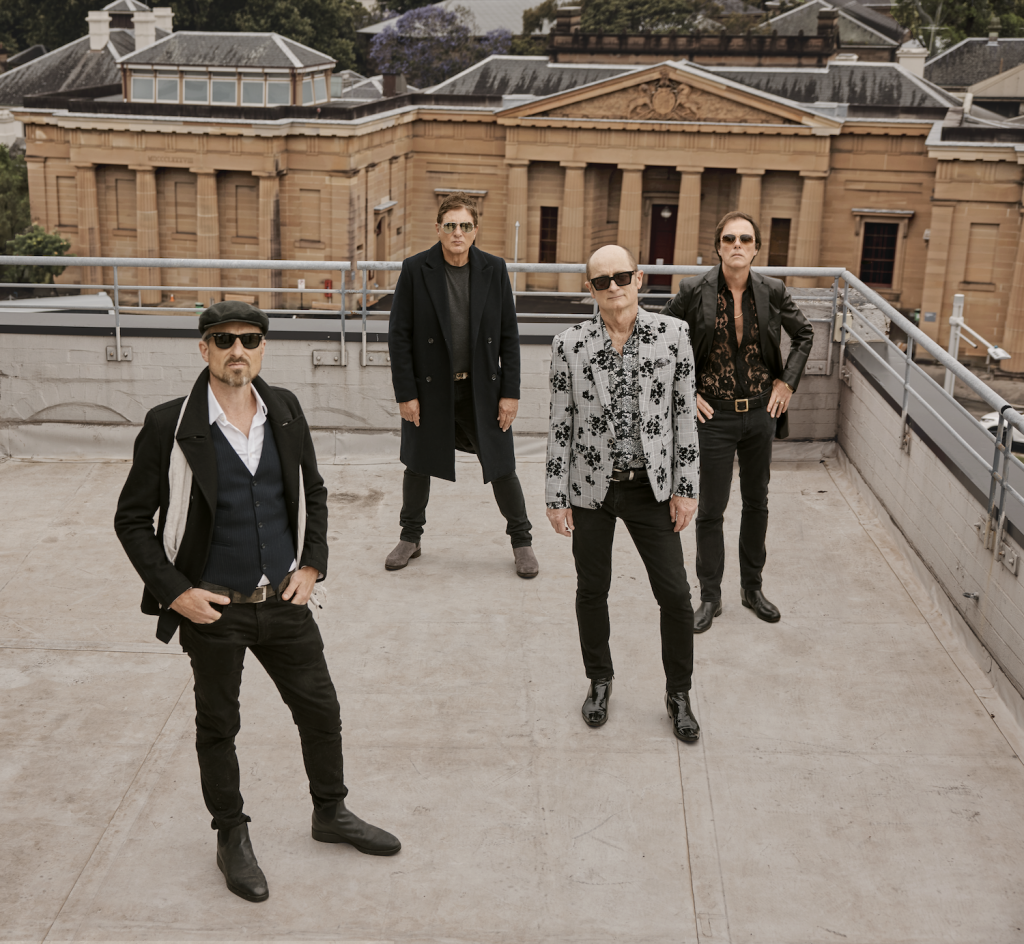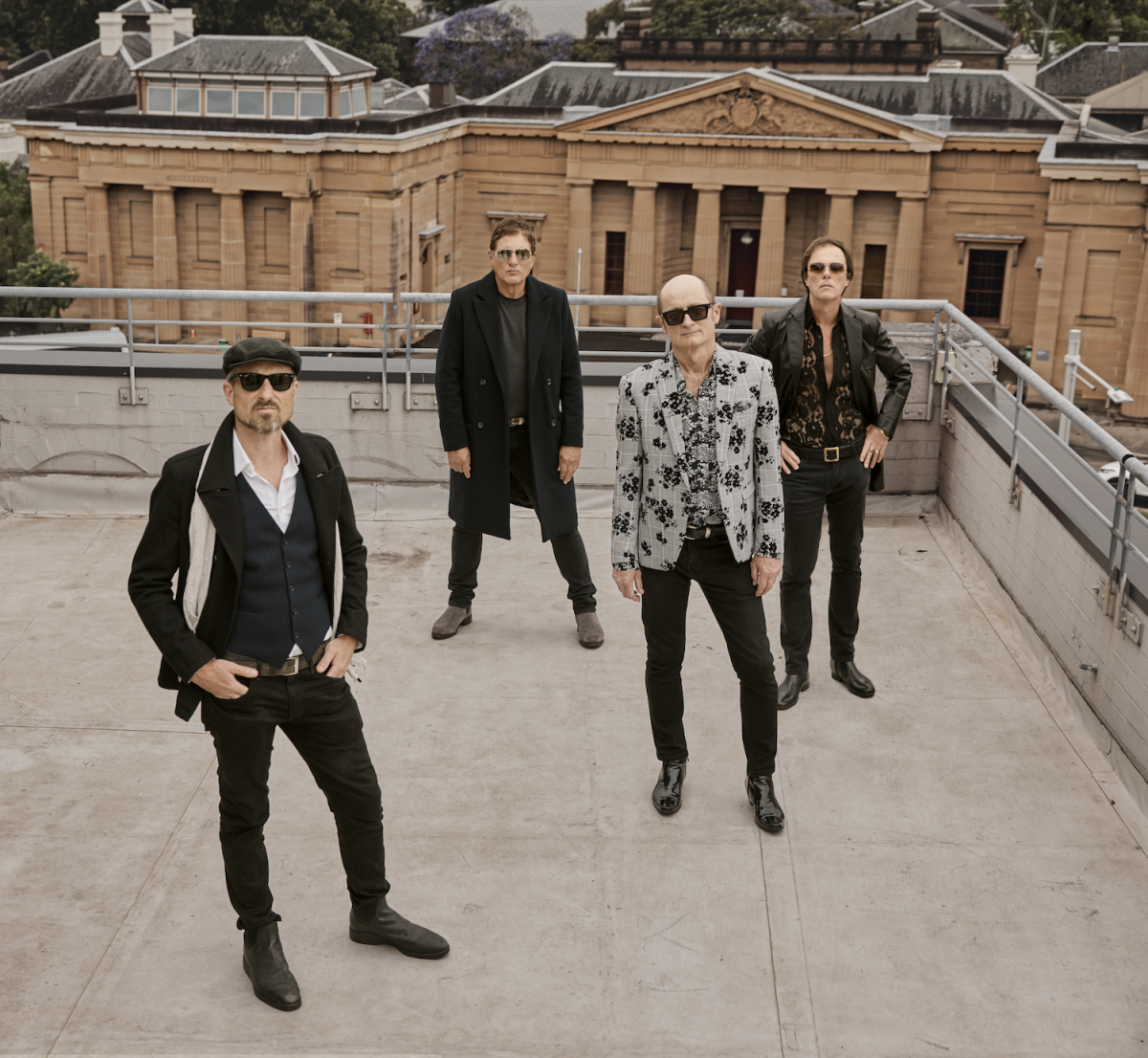
Sydney, Australia’s Hoodoos Gurus never quite conquered America. But almost was enough for Dave Faulkner, who counts his blessings when it comes to the band’s limited success here.
“Oh, yeah. We had a ball,” says the band’s genial front man. “We headlined the Fox Theatre for two nights in Atlanta … things like that.”
Modern-rock radio’s patience ran out for the Hoodoo Gurus in the early ’90s after five solid albums, including their excellent 1984 debut, Stoneage Romeos, and the next year’s even better follow-up, Mars Needs Guitars!. Fed by enthusiastic support in Australia, the Hoodoos hung in there until 1998, when they officially disbanded. Five years later, the quartet regrouped, and they’ve been an on-again, off-again enterprise ever since. They’ve had an impressive run at home, with nine top-20 albums, another nine top-40 singles and a host of multiplatinum albums.
The Hoodoos are kicking off they’re 41st year with the release of Chariot Of The Gods (Big Time Phonograph Record Co./EMI). Tours to support the album have been cancelled, but the band is staging a special livestream performance tonight, the day before the album’s official release. Chariot Of The Gods boasts a generous 14-track helping (17 on vinyl) of the band’s skewed sense of humor and sweet-and-sour bar-rock bravado. The latest lineup includes original members Faulkner (vocals, guitar), Brad Shepherd (vocals, guitar) and Richard Grossman (bass). Nik Reith has taken over on drums since the departure of longtime rhythmic sparkplug Mark Kingsmill. More on that later.
So Chariot Of The Gods is basically your first new music in 12 years?
That’s pretty close. We did a show in Sydney with all the original band members. There were three distinct lineups, and we played in all the different incarnations for one concert. Then we did an EP where we got each lineup to do [an original] song that had never been recorded by the band before. Then we had everyone play on a version of “Leilani,” our first single. The EP was called Gravy Train, and it came out about eight years ago. Other than that, though, you’re right.
Why so long?
As you get older, you get lazier—and I’ll take my share of the blame for that. I’m the main songwriter, and I procrastinate. But we also had something going on with the band. Mark Kingsmill—who’d been with us since our second album—was unhappy, and we didn’t know exactly what it was about. He decided he wanted to retire, and we didn’t know if we could continue, to be honest. Then Nik, our current drummer, came in for about 18 months. How do you talk about it in relationship terms? … It was the rebound romance. I don’t think we really appreciated what was in front of us, and we didn’t make the most of it.
Then Mark decided he was missing it and wanted to come back. He also was doing some renovations on his home that were costing more than he expected. When he came back, we felt like ourselves again. Ten months later, he was definitely done. He hasn’t picked up a drumstick in three years—except to stir a can of paint. We tried a lot of other drummers who weren’t as good as Nik, and we decided we didn’t want to look a gift horse in the mouth.
You certainly weren’t short on songs for Chariot Of The Gods.
I’m always accumulating things—like an artist’s sketch book with doodles in it. They’re never songs until I have to force myself when it’s time to make a record. At nine o’clock in the morning, I pick up a guitar, get in front of the computer, look at all these bits and pieces, and wait for the creative impulse. After the third or fourth day, my brain switches into work mode and I’m not self-consciously blocking myself—and the music flows.
Was the album recorded in one shot?
It was done as a series of singles. That was how we did our first album, Stoneage Romeos. We were unknown at the time, so the idea of making an album was a bit ambitious. In this case, we’d never worked with Nik before, so we didn’t know how far that was going to go, and it felt like a reboot of the band. Also, I liked the idea of being a bit more bespoke about it—finishing one song, having a rest, then coming back and doing another one. We did the “Answered Prayers” single just as COVID was bubbling up in China. Then we went back into the studio to rehearse “Carry On” and “Get Out Of Dodge,” and suddenly we were in lockdown. We didn’t see each other for several months, but we eventually expanded our risk zone to a single rehearsal space, then a studio with an engineer.
How do see your relationship with America?
We never had mainstream success, but we had huge underground success. And, by the way, we were in the dark ages. It was pre-Nirvana, when there was a big divide between alternative and mainstream and never the twain shall meet—and we were marketed that way. For our third album, (1987’s) Blow Your Cool!, we had a big hit in Australia with “What’s My Scene.” But in the U.S., the biggest song in our quiver was considered too weird and alternative for radio. The label focused on “Good Times,” because it had the Bangles singing on it. We loved the Bangles, but we were never going to be successful as a Bangles clone. In the label’s mind, we weren’t ready for success.
For better or worse, Blow Your Cool! seemed to represent a turning point for you guys.
Even though we had so much success with it, it wasn’t an album we were particularly fond of. Friends of mine in America say it’s their favorite album, and they hate me talking about it in that way. We allowed ourselves to be railroaded a bit, and we weren’t self-aware enough to not let it happen. We got a little bit cliched ’80s on the production, and the songs didn’t come out the way they should have. Our next album (1989’s Magnum Cum Louder), we made ourselves before we even had a new record contract. That’s the way it’s stayed for the rest of our career—we never sent another demo to a record label. So that was a very important moment for us.
—Hobart Rowland







